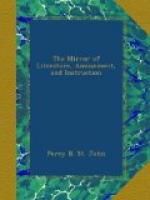If we use an uniform and homogeneous disc of silver that has never been hammered or compressed, its surface will oxidate equally, provided all its parts are equally heated. In the process of converting this disc into a coin, the sunk parts have obviously been most compressed by the prominent parts of the die, and the elevated parts least compressed, the metal being in the latter left as it were in its natural state. The raised letters and figures on a coin have therefore less density than the other parts, and these parts oxiditate sooner or at a lower temperature. When the letters of the legend are worn off by friction, the parts immediately below them have also less density than the surrounding metal, and the site as it were of the letters therefore receive from heat a degree of oxidation, and a colour different from that of the surrounding surface. Hence we obtain an explanation of the revival of the invisible letters by oxidation.
* * * * *
THE GATHERER.
* * * * *
Locomotive Engines have been established on the rail-roads near Philadelphia. The distance of 16-1/2 miles was performed by one of them going in an hour and thirteen minutes, returning (laden both ways) in an hour and eight minutes. The last mile was done in three minutes.
Blacking.—Shoes, among the classical ancients, were cleaned by a sponge; in the middle ages, by washing. Oil, soap, and grease were the substitutes for blacking, which was at first made with soot, but shone with a gloss.
Cool Tankard.—The custom of the Lord Mayor drinking a “cool tankard” with the governor of Newgate, on his Lordship’s way to proclaim Bartholomew Fair, is better known to our readers than the precise contents of the said tankard. In olden times the “cool tankard” was, or nearly coincided with, the wine mixed with Burrage, (so the translators call the herb) of Plutarch, and the Herbosum Vinum of Du Cange. In all probability, the “cool tankard” of our times implies a well-appointed dejeune a la fourchette.
Hanging—though as a punishment for thieves, ascribed to the reign of Henry I., occurs in a charter of Edgar. In hanging for public spectacle, an iron hoop with a strong chain was put round the body; but the chain was longer than the halter, so that when the latter was cut, the hoop slipped to the armpits, and left them suspended. When criminals escaped, an image of them was often hung up for several days; whence our hanging in effigy.
Elections.—Bribery, treating, canvassing, processions of voters at the heels of the candidate, dancing attendance after the great, forming factions, and other electioneering arts, occur in the classic ages. Among us, the candidates were not always present at the day of election, and under-sheriffs observe, that they mean to return according to the number of votes, provided the sheriff does not direct otherwise. Lord Chancellor Jefferies went to Arundel on purpose to overawe the electors. The seats were as much sought formerly as now. The members received wages as low as Elizabeth’s reign.




